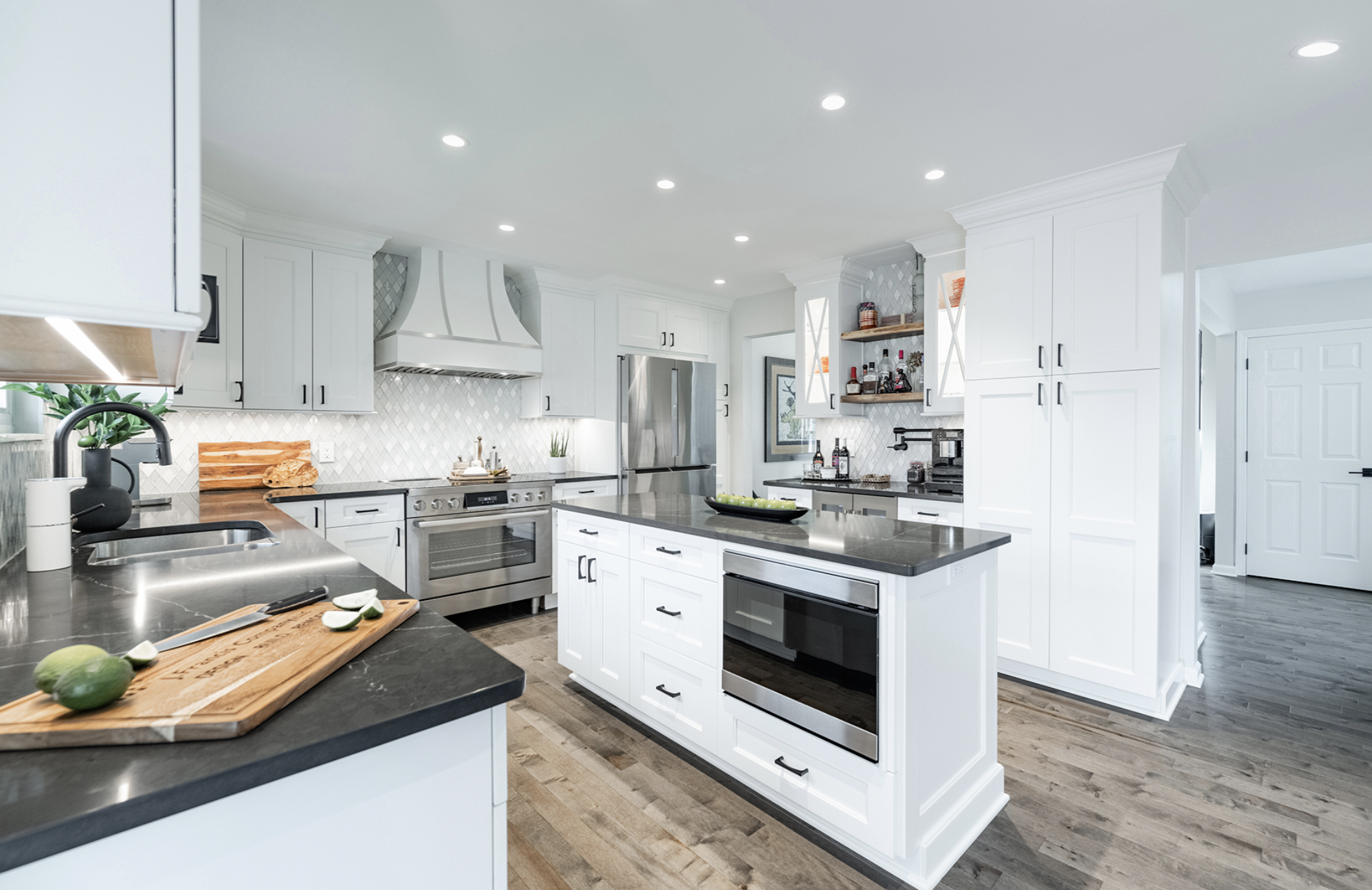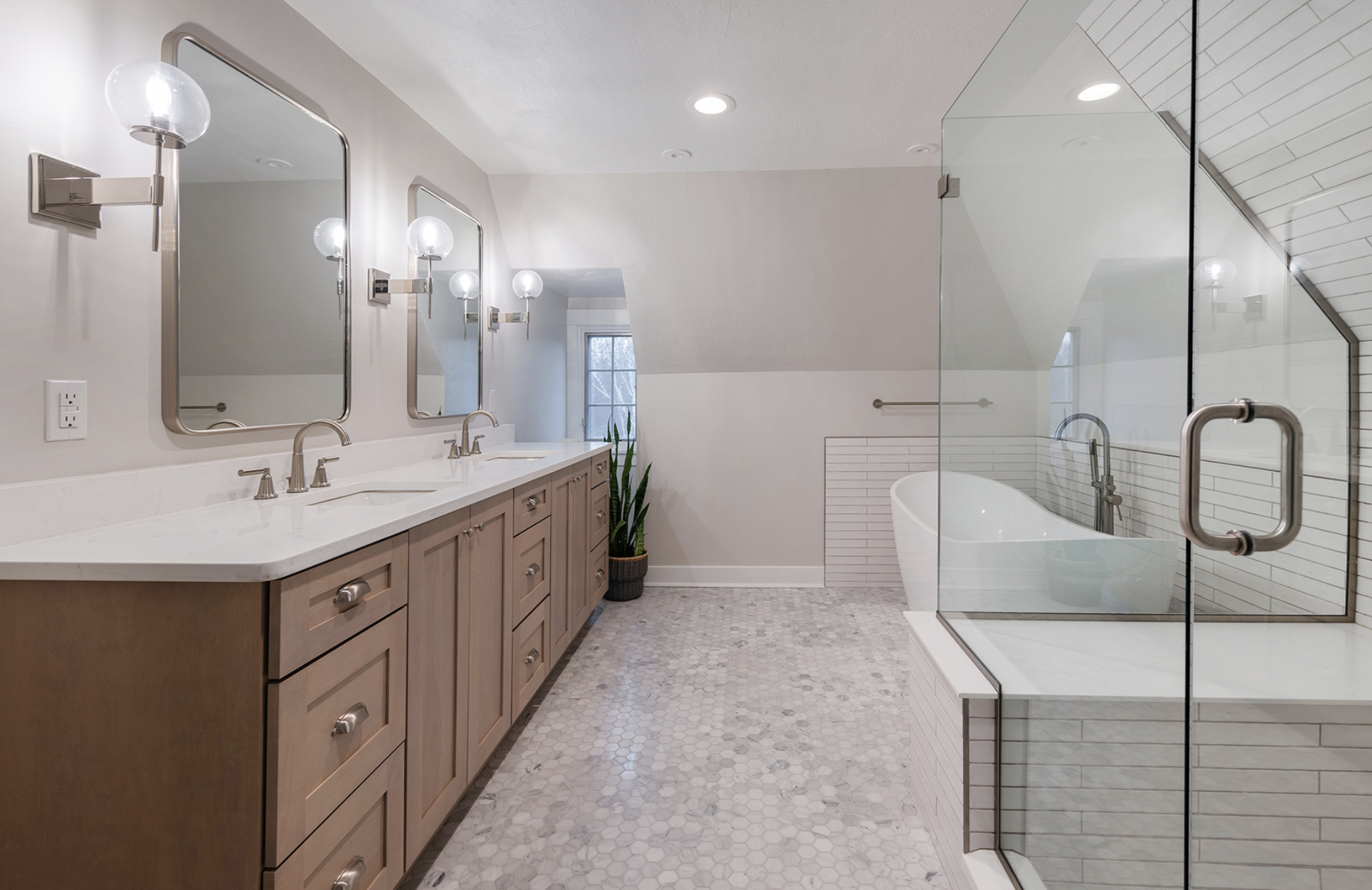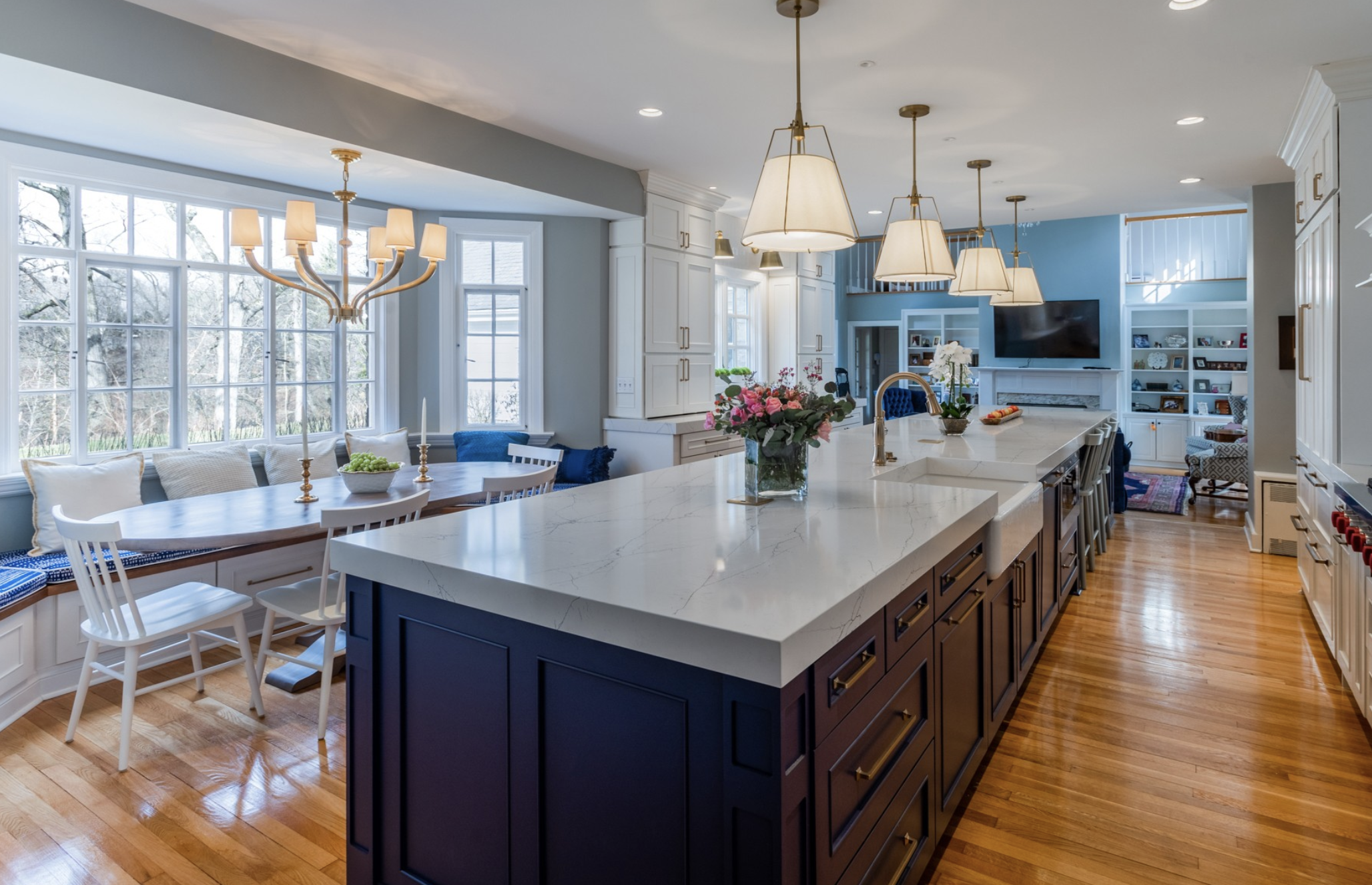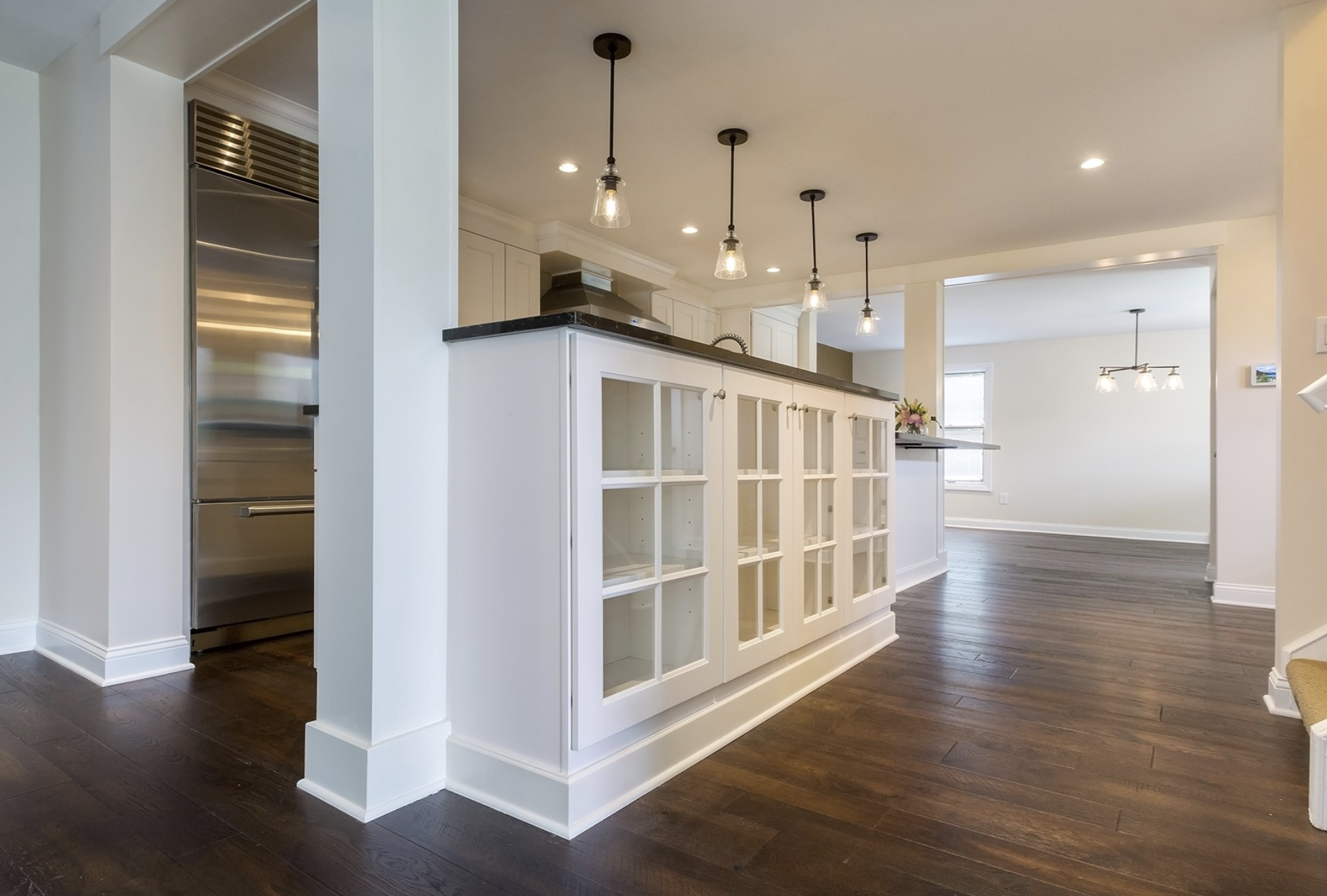Blog
Maintaining your flooring isn't just about keeping it clean; it's about preserving its beauty and integrity for years to come. Whether you have hardwood, LVP (luxury vinyl planking) laminate, or rigid core floors, each type requires specific care to ensure longevity. Since flooring can be overlooked, let's delve deeper into the intricacies of floor care, and a wide range of techniques and tools to keep your floors looking their best.
While there are many flooring options, hardwood, and LVP are the two most popular options in home renovations. Hardwood floors offer a classic, high-end look with long-term value but come with higher costs and maintenance needs. LVP provides a more affordable, durable, and low-maintenance alternative that is water-resistant and suitable for various areas of the home (think high-traffic areas).

Hardwood Flooring: Hardwood flooring is made from natural wood planks harvested from trees like oak, maple, cherry, and walnut. The planks are milled from a single piece of timber, which is then sanded, finished, and installed as flooring. Hardwood floors are known for their durability, longevity, and natural beauty. They can be stained and finished in a variety of ways, allowing for customization to fit different interior design styles. Hardwood flooring can be either solid wood, which is a single piece of wood, or engineered wood, which consists of multiple layers of wood veneers.
Luxury Vinyl Planking (LVP): Luxury Vinyl Planking (LVP) is a type of resilient flooring that mimics the appearance of natural materials such as wood, stone, or ceramic. LVP is made from multiple layers, typically including a base layer, a printed design layer, a wear layer for protection, and a top coating for added durability. It is constructed from synthetic materials like polyvinyl chloride (PVC), making it highly durable, water-resistant, and easy to maintain. LVP is designed to provide the look of high-end flooring materials at a lower cost and with easier installation. It is available in a wide range of styles, colors, and patterns, and can be installed using various methods, including glue-down, click-lock, and loose lay.

When planning a home renovation, choosing between hardwood and luxury vinyl planking (LVP) flooring can be a significant decision. Each flooring type has its own set of advantages and disadvantages, which can impact your choice based on your needs, lifestyle, and budget, so knowing the intricacies of your flooring type is paramount for effective maintenance. For example, hardwood flooring varies in hardness and susceptibility to scratches, so understanding the specific wood species and finish of your floors can guide your cleaning methods and product choices. Luxury vinyl flooring, while resilient, may still require special attention in terms of cleaning solutions and protection against direct sunlight to prevent fading.
When planning a home renovation, choosing flooring based on the best options for your home can be challenging, which is why here at J. Francis Company, LLC we have a designer that works with you one-on-one to customize your layout for long-term use and preservation in your home and flooring.
Consistency is key when it comes to keeping your floors clean and free of debris. When deciding between hardwood and luxury vinyl planking (LVP) floors, it's crucial to understand the differences in their care requirements. Here are some simple steps to help you maintain each type of flooring effectively.

Preventative measures can go a long way in preserving the integrity of your flooring. By implementing these simple precautions, you can safeguard your flooring against potential damage and prolong its lifespan.
Caring for and maintaining your flooring doesn't have to be a daunting task. By understanding the specific needs of your flooring type and implementing a regular cleaning routine, you can keep your floors looking their best for years to come.
Have more specific questions on flooring installation or care? Reach out to us directly - we'd love to hear from you. Email us here.
While there are many flooring options, hardwood, and LVP are the two most popular options in home renovations. Hardwood floors offer a classic, high-end look with long-term value but come with higher costs and maintenance needs. LVP provides a more affordable, durable, and low-maintenance alternative that is water-resistant and suitable for various areas of the home (think high-traffic areas).
Understand Your Flooring
Hardwood Flooring: Hardwood flooring is made from natural wood planks harvested from trees like oak, maple, cherry, and walnut. The planks are milled from a single piece of timber, which is then sanded, finished, and installed as flooring. Hardwood floors are known for their durability, longevity, and natural beauty. They can be stained and finished in a variety of ways, allowing for customization to fit different interior design styles. Hardwood flooring can be either solid wood, which is a single piece of wood, or engineered wood, which consists of multiple layers of wood veneers.
Luxury Vinyl Planking (LVP): Luxury Vinyl Planking (LVP) is a type of resilient flooring that mimics the appearance of natural materials such as wood, stone, or ceramic. LVP is made from multiple layers, typically including a base layer, a printed design layer, a wear layer for protection, and a top coating for added durability. It is constructed from synthetic materials like polyvinyl chloride (PVC), making it highly durable, water-resistant, and easy to maintain. LVP is designed to provide the look of high-end flooring materials at a lower cost and with easier installation. It is available in a wide range of styles, colors, and patterns, and can be installed using various methods, including glue-down, click-lock, and loose lay.
Pros and Cons of Hardwood vs. Luxury Vinyl Planking in Home Renovation
When planning a home renovation, choosing between hardwood and luxury vinyl planking (LVP) flooring can be a significant decision. Each flooring type has its own set of advantages and disadvantages, which can impact your choice based on your needs, lifestyle, and budget, so knowing the intricacies of your flooring type is paramount for effective maintenance. For example, hardwood flooring varies in hardness and susceptibility to scratches, so understanding the specific wood species and finish of your floors can guide your cleaning methods and product choices. Luxury vinyl flooring, while resilient, may still require special attention in terms of cleaning solutions and protection against direct sunlight to prevent fading.
When planning a home renovation, choosing flooring based on the best options for your home can be challenging, which is why here at J. Francis Company, LLC we have a designer that works with you one-on-one to customize your layout for long-term use and preservation in your home and flooring.
Hardwood Flooring Pros
- Aesthetic Appeal: Hardwood floors have a timeless beauty and natural warmth that can enhance the appeal of any home. The variety of wood species, stains, and finishes allows for a customizable look.
- Durability: With proper care, hardwood floors can last for decades, even a lifetime. They can also be refinished multiple times, which can renew their appearance and extend their lifespan.
- Added Value: Hardwood floors are highly sought after by homebuyers and can increase the resale value of your home.
- Eco-Friendly: Hardwood is a natural and renewable resource. Sustainable sourcing and certifications like FSC (Forest Stewardship Council) can make hardwood an environmentally friendly choice.
- Health Benefits: Hardwood floors do not trap dust, pet dander, or other allergens, making them a good choice for improving indoor air quality.
Hardwood Flooring Cons:
- Cost: Hardwood flooring can be expensive to purchase and install. The costs can vary significantly depending on the type of wood and the quality of the finish.
- Maintenance: Hardwood floors require regular maintenance, including occasional refinishing. They are also susceptible to scratches, dents, and water damage.
- Susceptibility to Moisture: Hardwood is sensitive to changes in humidity and moisture. Spills must be cleaned up immediately to prevent warping, swelling, or mold growth.
- Noise: Hardwood floors can be noisy, especially in high-traffic areas or multi-story homes, unless rugs or mats are used to dampen the sound.
Luxury Vinyl Planking (LVP) Pros:
- Cost-Effective: LVP is generally more affordable than hardwood, both in terms of material and installation costs. It offers a budget-friendly alternative that can mimic the appearance of wood.
- Durability: LVP is highly durable and resistant to scratches, dents, and stains. It's an excellent choice for high-traffic areas and homes with pets and children.
- Water Resistance: Unlike hardwood, LVP is water-resistant and can be installed in moisture-prone areas such as kitchens, bathrooms, and basements.
- Low Maintenance: LVP requires minimal maintenance. Regular sweeping and occasional mopping are usually sufficient to keep it looking good.
- Comfort and Insulation: LVP provides a softer feel underfoot compared to hardwood and can offer better sound insulation.
LVP Cons:
- Aesthetic Limitations: While LVP can closely mimic the look of hardwood, it may not fully capture the natural beauty and texture of real wood. Some people may prefer the authenticity of hardwood.
- Longevity: LVP, while durable, does not have the same lifespan as hardwood. It cannot be refinished, and once it wears out, it will need to be replaced.
- Environmental Concerns: LVP is made from synthetic materials, which may raise concerns about environmental impact and sustainability. It's essential to look for products that are low in VOCs (volatile organic compounds) and environmentally certified.
- Value Addition: While LVP can improve the look of your home, it may not add as much resale value as hardwood flooring.
Establish a Regular Cleaning Routine
Consistency is key when it comes to keeping your floors clean and free of debris. When deciding between hardwood and luxury vinyl planking (LVP) floors, it's crucial to understand the differences in their care requirements. Here are some simple steps to help you maintain each type of flooring effectively.
Cleaning Hardwood floors:
- Regular Sweeping: Regular sweeping with a dry mop or a dust mop is essential. This prevents the accumulation of dust and debris which can scratch the surface.
- Vacuum Cleaner: Use a vacuum cleaner without a beater bar. The wand attachment is ideal for reaching corners and under furniture without causing damage.
- Wet Mop: Avoid using a wet mop or excess water. Water can seep into the wood, causing it to swell or warp. A damp cloth or soft cloth is preferred for spot cleaning.
- Microfiber Mop: For regular maintenance, a microfiber mop can trap dust and dirt effectively without the need for excessive moisture.
- Cleaning Products: Use the right cleaning products and tools to avoid damage. Isopropyl alcohol can be used for spot-cleaning stubborn stains.
- Steam Cleaners: Avoid steam mops or steam cleaners as they can trap moisture and cause damage.
- High Heels: Avoid walking on hardwood floors with high heels as they can cause dents and scratches.
Cleaning Vinyl Floors:
- Regular Sweeping: Sweep regularly with a dust mop to remove debris that can cause scratches.
- Vacuum Cleaner: Use a vacuum cleaner designed for bare floor surfaces.
- Wet Mop: Unlike hardwood, LVP can be cleaned with a wet mop. Ensure that the mop is not overly wet to avoid excessive water.
- Microfiber Mop: A microfiber mop can also be used for regular cleaning.
- Steam Cleaners: Some rigid core floors can handle steam mops, but always check the manufacturer's recommendations.
- Spray Mop: A spray mop with clean water and a mild cleaner is an easy way to maintain the shine and cleanliness of LVP.
- Abrasive Cleaning Soaps: Avoid abrasive cleaning soaps and acidic substances that can damage the finish.
Spot Cleaning and Stain Removal
Dealing with spills and stains promptly can prevent them from becoming permanent eyesores on your floors. When addressing stains, it's essential to choose the right cleaning solution based on the type of flooring and the nature of the stain. For example, while vinegar and water can effectively clean laminate flooring, hardwood floors may require a specialized cleaner to avoid damaging the finish. Taking immediate action and using appropriate cleaning methods can ensure that your floors remain spotless and free of blemishes.Protect Your Floors from Damage
Preventative measures can go a long way in preserving the integrity of your flooring. By implementing these simple precautions, you can safeguard your flooring against potential damage and prolong its lifespan.
- Relative Humidity: Maintain optimal relative humidity in your home to prevent damage to both hardwood and vinyl floors.
- Use Mats: Placing mats at entryways and strategic locations throughout your home can trap dirt and moisture, preventing them from being tracked onto your floors.
- Floor Age: Older floors may require different care, so always consider the floor age when selecting cleaning products.
- Heavy Furniture: Using felt pads or floor protectors under furniture legs can shield your floors from scratches and dents caused by daily wear and tear.
Avoid Excessive Moisture and Standing Water
Moisture is one of the biggest enemies of flooring, capable of causing irreversible damage if left unchecked. Whether you have hardwood, laminate, or vinyl flooring, it's essential to minimize exposure to excessive moisture and promptly address any spills or standing water to prevent moisture from seeping into the floorboards and causing warping or mold growth.Regular Maintenance Checks
Periodically inspect your floors for signs of wear and tear, such as scratches, dents, or loose planks. Address any issues promptly to prevent further damage and prolong the life of your flooring. Additionally, monitor the humidity level in your home, as fluctuations can affect the condition of your floors.Caring for and maintaining your flooring doesn't have to be a daunting task. By understanding the specific needs of your flooring type and implementing a regular cleaning routine, you can keep your floors looking their best for years to come.
Have more specific questions on flooring installation or care? Reach out to us directly - we'd love to hear from you. Email us here.